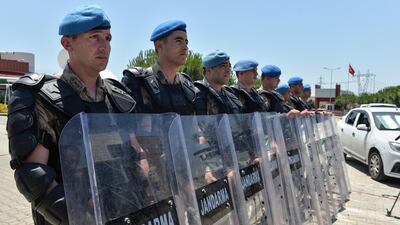The leader of Turkey’s main opposition party on Tuesday joined the growing chorus against the trial of philanthropist Osman Kavala and 15 others accused of organising the 2013 Gezi protests.
Kemal Kilicdaroglu, head of the Republican People’s Party (CHP), described the protests as a “one of the most democratic acts of the world”.
He said the aim of the trial, which began on Monday, was to “take revenge on the young people who participated in Gezi”.
“Gezi is a legacy that Turkey has left to world history. It allowed Turkey to breathe during the most oppressive period. Those who participated in Gezi were our children, they were young people of all views,” Mr Kilicdaroglu said.
The protests began as a small demonstration against the redevelopment of Taksim Gezi Park in central Istanbul but spiralled into a nationwide clamour against the government after police responded with tear gas and water cannon against peaceful protesters.
At the time, President Recep Tayyip Erdogan – then serving as prime minister – condemned the demonstrators as looters and vandals.
His comments on Tuesday stood in contrast to Mr Kilicdaroglu’s. “When they set their eye on our unity by stirring up the streets during Gezi, our nation broke this game,” he told his party.
“When they tried to drown our country’s cities in blood, our nation crushed the heads of the terrorists.”
Mr Kavala, the founder of Anadolu Kultur, which promotes peace and dialogue through cultural projects, is one of the most prominent defendants and has been in pre-trial detention for 20 months. He is accused of financing the protests with the backing of billionaire George Soros.
The 657-page indictments says the defendants, six of whom are being tried in their absence, organised the protests in a bid to overthrow the government. They are also held responsible for injuries and damage to property that occurred during the protests.
They face life imprisonment if convicted.
On Tuesday, defendant Can Atalay denounced the trial, held at Silivri prison on the outskirts of Istanbul, as an “attempt to smear one of the most honourable social incidents in the history of Turkey”.
Mucella Yapici, an executive of the Istanbul Chamber of Architects, is facing her second trial, having been acquitted of similar charges in 2015. She said she was presenting the same defence as she did to the previous charges. “If I write something new, that would mean I accept this indictment that is not based on facts,” she told the court.
Many of the accused were members of Taksim Solidarity, founded by architects and city planners to oppose plans to build a shopping centre on the park.
“It is not a crime to object to the project planned in Gezi Park, nor to file a lawsuit and to inform the public,” defendant Tayfun Kahraman said.
The defendants all deny the allegations – based on telephone calls, social media posts and travel abroad – and say the protests were a spontaneous outbreak of opposition to the government without any central planning.
Human Rights Watch condemned the trial as an attempt to “silence and punish the defendants for their legitimate and entirely peaceful civic activities and work.”
